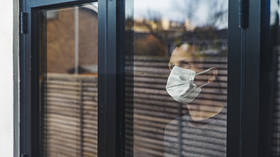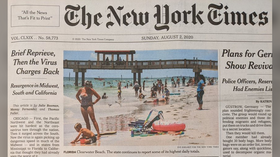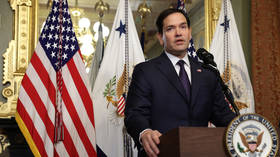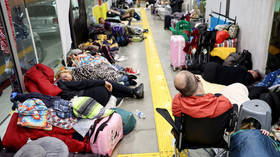Face masks at home: The latest sign that public health officials have lost any sense of perspective

There’s still no universal agreement on whether face masks can really prevent the spread of Covid-19, but it’s now being suggested they should be worn even at home. So, where is this appetite for restrictions going to end?
Anyone who’s followed the demands of public health authorities in recent years will know that no level of restriction on personal autonomy is ever enough. There’s always another big idea that will save us from ourselves. To tackle obesity, for example, it’s never sufficient to tell people to eat less and move more. In the UK, we've had taxes on sugary drinks, restrictions on the size of chocolate bars and other snacks, and endless nagging campaigns. So, it’s no surprise that once a government starts to make face masks mandatory in one place, it soon deems it necessary to wear them in other places.
For months, the UK government held the line that the evidence on the effectiveness of masks in controlling Covid-19 was weak. Indeed, following the line from the World Health Organization, senior health officials argued that routinely wearing a mask was not only useless but could make matters worse. The virus is too small to be stopped by anything but the most non-porous masks, we were assured. Moreover, untrained people wearing a flimsy ‘surgical’ mask or a simple cloth mask would inevitably fiddle with them, it was suggested. If they happened to be infected themselves, they could touch the mask and then touch other surfaces, infecting those surfaces with the virus.
Since the early days of the pandemic, some have argued that this advice was wrong. Face masks, they said, could be useful. In June, the World Health Organization amended its advice to say face masks were advisable in situations where social distancing was impossible, such as on crowded public transport. While the UK government then made regulatory the wearing of masks on trains, Tubes and buses, it seemed less than convinced that they should be worn in shops or other public places.
But since then, there has been a bout of mask mania. Whether to wear a mask or not has become entwined with the wider culture wars. Not wearing a mask is seen as a defiant statement of autonomy, while wearing a mask is a signal you are an educated, caring individual who puts protecting society above personal inconvenience. By mid-July, just a day after senior ministers had publicly declared they weren’t necessary, masks became mandatory in shops.
And the result! A call for masks to be worn in more and more places. Last week, British PM Boris Johnson announced that mandatory mask-wearing would be extended to other enclosed public spaces, such as museums, churches and cinemas. Yet social distancing is perfectly possible in these places. Museums only ever get seriously crowded when they are either tourist hotspots or during blockbuster exhibitions, when rarely seen artworks are put on show for a limited time, and those problems can easily be dealt with by restricting ticket sales.
Also on rt.com Project Fear’s success: If face coverings are so effective, why weren’t maskists advocating them during 2018 killer flu epidemic?In Spain, many regions demand that everyone wears a mask anywhere outside their own homes. This is clearly bonkers. There is a very low risk of catching this virus outdoors and donning a face mask would make precious little difference to that.
Now, news comes from the US that even the respite of being able to close your front door and take off your mask might be taken away. Dr Deborah Birx, the White House’s coronavirus task force co-ordinator, has warned that the rise in positive tests marks a “new phase” of the pandemic.
Birx told CNN that Americans “definitely need to take more precautions”. She added: “If you’re in multi-generation households and there’s an outbreak in your rural area or in your city, you need to really consider wearing a mask at home, assuming … you have individuals in your house with comorbidities.”
Some people, such as the elderly and those with an existing serious illness, certainly do need to take extra care. If they contract the virus, the resulting disease is more likely to lead to hospitalisation and even death. If someone in your own home has the disease, there might indeed be sense in taking every possible precaution. But routinely wearing masks at home if there is simply an outbreak in your city is just crazy. Even where there are apparent outbreaks, the risk still seems low.
For example, the English city of Leicester recently had lockdown regulations re-imposed because it was estimated that 0.15% of the population was infected. Large parts of north-west England are now facing restrictions on households meeting each other due to infection rates that are far lower even than those in Leicester.
At what point would Birx trigger an alert for everyone to wear masks 24/7? Is there any end to the impositions that will be placed on us in the name of stopping coronavirus?
Meanwhile, the Netherlands has taken a different approach. In keeping with the WHO’s advice, wearing a face mask on public transport is mandatory. But everywhere else, the Dutch government doesn’t even advise people to wear masks, never mind make them compulsory. Coen Berends, spokesman for the National Institute for Public Health and the Environment, said: “Face masks in public places are not necessary, based on all the current evidence. There is no benefit and there may even be a negative impact.”
If the science on face masks is so clear cut, why are countries taking such different approaches to the question?
The stories of significant virus outbreaks suggest it’s transmitted in situations where there is sustained, close personal contact. Recent clusters in the UK have included a farm where migrant workers lived close together in dormitories, and a call centre. Other notable outbreaks around the world have occurred in meat-processing plants, in churches, at networking conferences and even as a result of choir practices – all places and occasions where people couldn’t keep their distance from one another or where it had yet to be realised that close contact could be dangerous.
What we don’t hear about is sustained transmission from meeting people outdoors or in shops. Perhaps in other countries, people are more gregarious in the supermarket, but Brits rarely say a word to strangers while grabbing their groceries. The only people they really talk to are the workers at the checkout, who are now safely behind Perspex screens. Face masks in these situations surely make little or no difference.
The call for wearing face masks at home shows how public health officials will always chase every small possible risk. It’s up to the politicians to balance the marginal benefit from every extra precaution against the imposition on our personal liberty, but many are as enthusiastic about more clampdowns as the medics.
Back in the 1980s, in response to the AIDS pandemic, the American author Susan Sontag noted the “striking readiness of so many to envisage the most far-reaching of catastrophes”. Not so much ‘Apocalypse Now’ as ‘Apocalypse From Now On’. The overblown reaction to Covid-19, and the complete loss of perspective among public health officials, seems to confirm her point.
The statements, views and opinions expressed in this column are solely those of the author and do not necessarily represent those of RT.

















